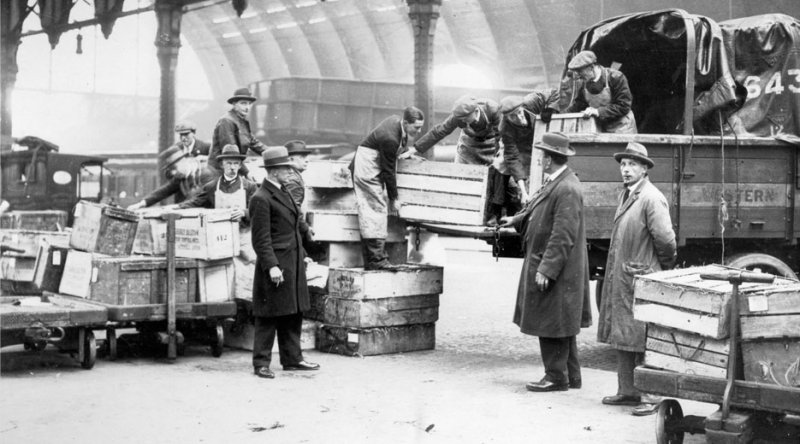On May 4, 1926, the Trade Union Congress called a General Strike in response to government plans to change the working conditions for coal miners. More than two million workers across Britain, including railwaymen, went on strike. The railway companies resorted to recruiting volunteers with no railway experience to act as train drivers and signalmen. File Photo courtesy The National Archives
LONDON, May 4, 1926 (UP) -- Fifty million people were plunged into economic chaos today as Britain's great general strike became effective.
Streets in London and provincial cities presented scenes of fantastic confusion as people deprived of all major transportation facilities struggled to carry on their every day affairs.
At midnight the strike orders went into effect. A creeping paralysis spread over the land.
Almost four and a half million workers come within the scope of the strike orders. Trades union officers give the official number of strikers as 4,342,982. Other millions are indirectly affected. With service of supply stopped, many non-strikers cannot work.
The great economic upheaval came after careful last-minute efforts on behalf of the government to bring peace. Despite lengthy deliberations, however, neither Prime Minster Stanley Baldwin's government nor the labor leaders, headed by the Laborite J. H. Thomas would concede vital points of their position. The government had insisted striking miners accept the coal commission's report, which provides for readjustment of the coal industry and lowering of wages.
With the stoke of midnight, walkouts began in the industries and services operated by members of the National Union of Railwaymen, the Society of Locomotive Engineers, the Railway Clerks Association, the Telephone Workers Union, the Iron and Steel Trades Confederation, the Electrical Trades Union and the Printers Union.
Thruout Britain the government has mobilized all resources to cope with the strike. The navy, the army, local authorities and citizen volunteers are preserving order, and carrying on services of transportation and communication wherever possible.
Labor will fight this strike to the end, A. J. Cook, secretary of the miners' federation, said today. "We have no intention of reopening negotiations with the government, " he said.
The Trades Union Council today met with the miners' executive and other leaders to discuss means of feeding strikers, women and children.
A proclamation issued by the labor leaders early this morning read as follows:
"Responsibility for this national crisis rest with the government. With the people the trades unions have no quarrel. On the contrary, the unions are fighting to maintain the standard of life for the great mass of the people
"The trades unions did not enter the fight without counting the cost. They are assured that all trades unionists in the country will stand loyally by the instructions of their leaders who have issued orders that violence and disorder must everywhere be avoided no matter what the excitement.
"Let no one be disturbed by rumors, or driven by panic to betray our cause.
"Stand firm and we win."
Despite the desire of the strike authorities to maintain order in their ranks, minor incidents have already occurred.
A gang of 40 strikers rushed the doors of the office of the London Daily Telegraph early this morning. The raid apparently was unorganized. The men were driven off by three guards.















